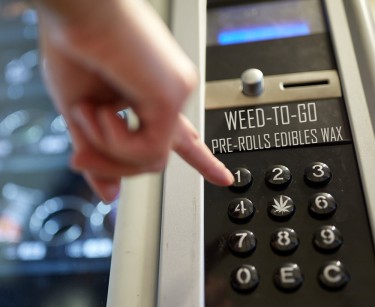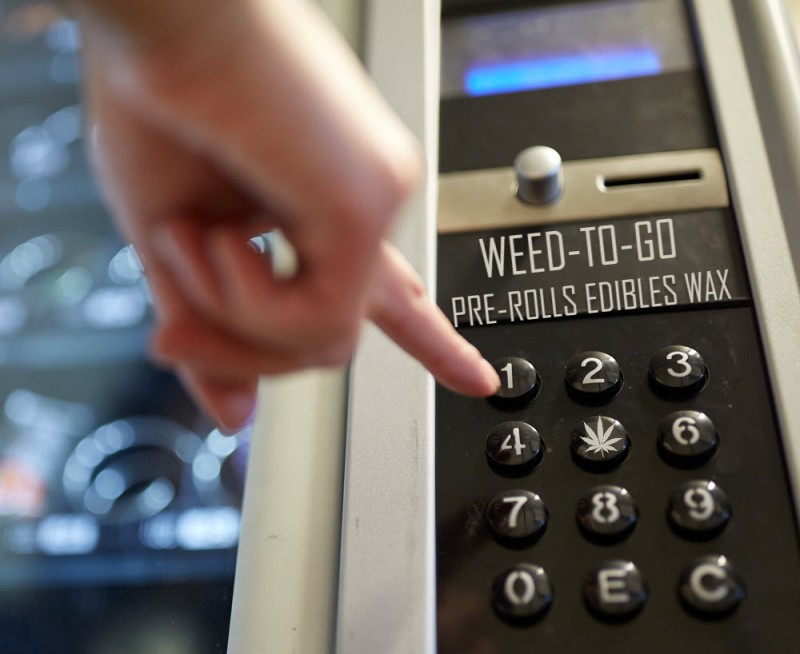
Just recently, a man in Detroit was arrested by the police after he was discovered selling kilos of marijuana in his home. During the arrest, the police also discovered about 18 guns in his home and how he cleverly operated a vending machine outside his home for cannabis sales. It seems while the state is moving forward toward cannabis legislation, he just couldn't wait for the official go-ahead.
According to a report, the suspect, identified as Marcellus Cornwell, was raking in about $2,000 every day from pills and weed sales via the vending machine. Apparently, the suspect has been illegally selling cannabis using the same cannabis vending machine for almost five years.
Following a report from WYXZ, police officials carried out surveillance at the suspect's residence and partook in two different cannabis purchases. The controlled purchase was made via the cannabis vending machine initially around February, and the second time in March 2022.
After confirming their suspicions, a search was executed in March at the recent address established, and finally, Marcellus Cornwell and an unidentified man were arrested.
A profitable Business
Cornwall, upon interrogation, admitted to the police that most of his income came from the marijuana vending machine. He claimed he rakes in an average of $2,000 every day which offered him a good living.
Following several delays and hesitations, the Council of Detroit City finally enacted legislation that allows the sale of cannabis for adult use. The announcement came in very early in May after a landslide vote for cannabis legislation.
With the announcement hitting the city, a land grab has been set off resulting in the price of properties in areas zoned for cannabis dispensaries. This is an indication that Detroit is very eager to meet up and cash on the profitable cannabis industry in Michigan. Evidently, Marcellus Cornwell couldn't wait for the legislation to happen.
New opportunities amidst recreational cannabis sales in Detroit.
On the 5th of April 2022, a vote of 8-1 saw the Council of Detroit City pass the legislation to allow the sale of recreational cannabis to kick off in the city. This is a major development after several months of delay and anticipation. Michigan approved recreational marijuana sales a year earlier as a state.
According to the sponsor of the legislation and the president of the City Council, James Tate, the legislation is purely equity-driven. Hence, both Brown and Black Detroiters will have the same opportunities to own cannabis businesses in Detroit city.
According to Tate, the legislation is offering the most lucrative opportunity for Legacy Detroiters and equity applicants to contend for the licenses. While giving his statement on the legislation, Tate also affirmed that it is vital for the state to strategically evaluate and identify the integration of the cannabis industry in Detroit. He believes that will be a better strategy compared to a 'shotgun' approach where the license is granted to everyone who wants one.
Impact of cannabis legislation on Detroit
According to the CEO of Common Citizen, a cannabis firm based in Michigan, Michael Elias, enacting the adult-use legislation is a vital win for the largest city in Michigan. He believes the legislation will help create new and more job opportunities while contributing to the comeback of Motor City.
During an interview with Benzinga, Michael added that the feat is a huge one for Detroiters and individuals reading in its surrounding neighborhood. He claimed many have been looking for access to recreational use of cannabis since its approval in 2018. He affirmed that at Common Citizen, the firm looks forward to producing high-quality, and safe cannabis products for recreational use to adults across Detroit.
The CEO of New Standard, also a cannabis firm based in Michigan, Howard Luck off, had a positive reaction to the announcement. He affirmed that the registration is a great move for the city and its citizens who will no longer need to leave the city to get cannabis.
Michigan’s lucrative cannabis industry
Patrick L. Anderson, the CEO, and principal of Anderson Economic Group together with Andrew Miller, the AEG consultant, gave testimony on the 5th of April, 2002. The testimony was delivered, proving the lucrative potential of the cannabis industry in Michigan
At the committee hearing, both speakers testified about the economics and numbers of the cannabis market in Michigan. They evaluated their results basing it on AEG's latest research which quantified the demand for cannabis products within the state.
Some vital points both speakers noted include;
-
In 2020, Michigan recorded a cannabis market worth about $3.2 billion cannabis with about 300 licensed retail stores for adult-use, and 400 licensed medical centers. This account got 15% and 16% of the entire market size respectively.
-
Approximately 70% of cannabis consumption within the state occurred outside retail stores. This was either through illicit transactions, medical caregivers, and home cultivation. This accounted for the 69% left of the market size.
-
In 2020, over 80% of Michigan citizens now live within a short drive to medical centers or recreational cannabis shops. The report also showed that 20% of Michiganders consumed marijuana in 2020.
-
In 2020, legal sales of marijuana were reported to be approximately $1 billion, with the regulated marijuana industry earning $169 million in fee revenues and tax.
According to Miller, the AEG consultant, consumer demand for marijuana in the last six years has increased exponentially. He went on to say that while the first medical center launched in 2018, and cannabis stores for adult use in 2019, many Michiganders obtained cannabis outside retail centers in 2020.
From a report published by Public Opinion Strategies and Greenberg Quinlan Rosner Research, more than 75% of residents in Michigan are in support of recreational and medical cannabis being captured under the same regulation. The regulation is said to include safety, testing, licensing, and tracking.
The report also revealed that more than 80% of respondents support the need for unlicensed cannabis products to test their products for toxic elements. They believe these farmers should undergo similar standards of testing as licensed processors and growers.
Conclusion
It is evident that many are eager to tap into the growing cannabis market in Detroit and without any doubt, the industry will become a big one once legislation is in full swing. However, while the emotion and spirit are high Marcellus Cornwell's case should serve as a cautionary tale so you don't jump before the gun
MORE ON CANNABIS VENDING MACHINES, READ THESE...
WILL CBD VENDING MACHINES CHANGE OUR EATING HABITS?








